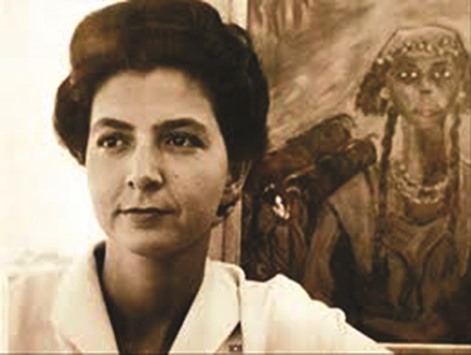Not just a remarkable artist, she was a true revolutionary, a social reformist and a political activist who upheld her beliefs against every adversary and in the face of every hardship. Inji Efflatoun, the late Egyptian artist, left a great impact on her country’s art scene with her work that portrayed and expressed in her unique style the life of ordinary Egyptians who worked hard to build their country.
Mathaf: Arab Museum of Modern Art has featured her works alongside four other greats from the region in its ‘Focus’ inaugurated early this year. Drawn from Mathaf’s permanent collection and curated by Leonore-Namkha Beschi, the selection of artwork showcased focuses on the body of work of Inji Efflatoun (1924-1989), covering the period 1952-1982.
To elaborate on the body of her work and to elucidate its significance for even the subsequent generations, Beschi is scheduled to deliver a talk on ‘Mother Tongue: Selected works by Inji Efflatoun’ at Mathaf on August 27.
“Born in Cairo, Egypt, the artist was determined to live her life as a painter, a feminist and a political activist, filled with the urge to investigate her own heritage and connect with the Egyptian people,” says the curator.
With last few weeks of Focus left, the curator will talk about Efflatoun’s compelling series of Egyptian working class portraiture that allows the audience to expose the conflicted relationship the artist experienced with an aristocratic and anachronous upbringing.
Efflatoun’s artistic practice testifies to the progressive and revolutionary ways of thinking inherent to an Egyptian modernity falling into place. She was a pioneer of modern Egyptian art and one of the important Egyptian visual artists. During school, she liked to paint and her parents encouraged her. Her private art tutor, Kamel al-Timisani, a leader in an Egyptian Surrealist collective called the Art and Freedom Group, introduced her to surrealist and cubist aesthetics.
Her paintings of that period were influenced by surrealism. She later recalled that people were astonished by her paintings and wondered “why a girl from a rich family was so tormented”. She stopped painting from 1946 to 1948, considering that what she was painting no longer corresponded to her feelings.
Her interest was later renewed after visiting Luxor, Nubia, and the Egyptian oases. During these trips, she had the opportunity to penetrate the houses and sketch men and women at work. She studied for a year with the Egyptian-born Swiss artist Margo Veillon.
During this period, she made individual exhibits in Cairo and Alexandria and showed at the Venice Biennale in 1952 and the Sao Paulo Art Biennial in 1956. In 1956, she became friends with and was later influenced by the Mexican painter David Alfaro Siqueiros. She was able to continue painting during her imprisonment.
Her early prison paintings are portraits, while the later are landscapes. In the years after her liberation, she exhibited in Rome and Paris in 1967, Dresden, East Berlin, Warsaw and Moscow in 1970, Sofia in 1974, Prague in 1975 and New Delhi in 1979.
Her paintings are filled with lively brushstrokes of intense colour reminding some observers of Van Gogh or Bonnard. Her art of later years is characterised by an increasing use of large white spaces around her forms. A collection of her works is displayed at the Amir Taz Palace in Cairo.
The curatorial methodology implemented in the Focus series explores multiple artistic approaches towards major topics of modernity, including identity, invention and experimentation in art. Efflatoun, like other artists featured in the series, believed they had a responsibility as intellectuals to embrace historical traditions and social progress.
These artists gave a direction to artistic practice in ways that have proved crucial for subsequent generations. Their diverse backgrounds, education, and interests, as well as their dedication to social reform, allowed for original yet universal creation.
Leonore-Namkha Beschi is a curator at Mathaf: Arab Museum of Modern Art, Doha. Previously working as a co-ordinator at The Third Line, Dubai (2009-2011), she established her knowledge for modern and contemporary artists from the Mena region.
Between 2011 and 2012, she was appointed project and collection manager at the Salsali Private Museum, showcasing collector Ramin Salsali’s private collection as the first Collector Center in the region. She holds among her degrees an MA in Art History and Visual Arts from Marc Bloch University in Strasbourg, France. The one-hour talk will be held 5pm at Mathaf.

ICONIC: Egyptian artist, the late Inji Efflatoun, was determined to live her life as a painter, a feminist and a political activist.
